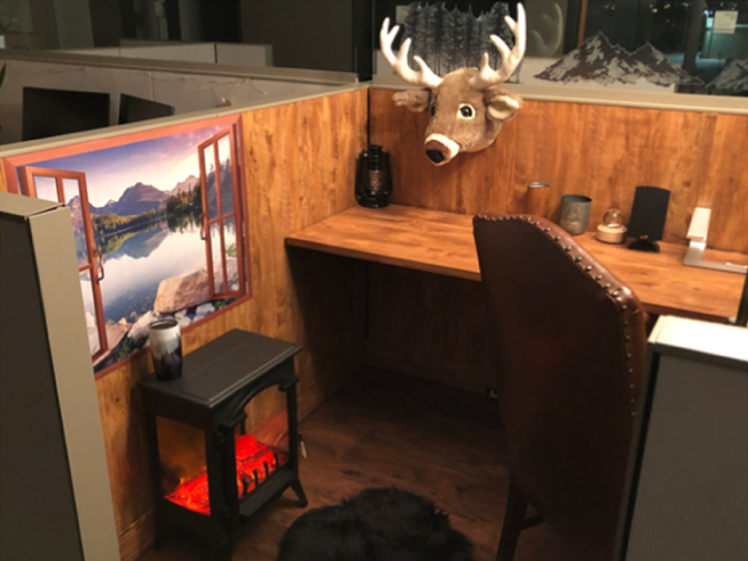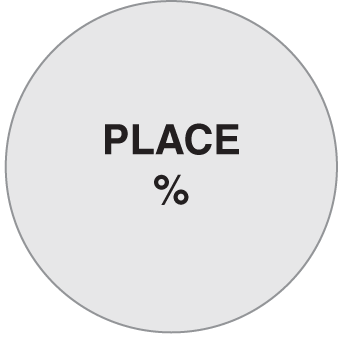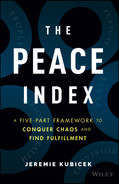CHAPTER FOUR
Place: The Spaces That Supercharge Us
Dave and Millicent Gillogly lived half of the year in the Garden of Eden, which just happens to be in Silver Gate, Montana.
Their house was exactly what you picture in a log cabin mountain home. A large fireplace and a large loft for guests. Their backyard was a rolling river, and their front yard was Yellowstone.
I took my son, Will, there when he turned 10 years old. The first day we arrived we saw a bison running through town. On one of our epic fly‐fishing trips, we saw signs of grizzly bears everywhere.
Will and I were just visiting for a few days, but the Gillogly's lived there—in paradise.
Every time I saw Dave, he would get the biggest smile on his face because Yellowstone, and his home, filled his cup. It was his happy Place.
One of the most memorable things that Dave would do was to wood burn the names of their guests on a wooden plaque and hang it on the wall going up the stairs. Dave and Millicent shared their Peace often. They allowed others, like Will and me, to experience their space, their Place. And we were grateful. That trip continues to be one of the best experiences of our lives because Dave Gillogly shared his Peace.
Every circle is interconnected. Personal Health can affect Purpose in the same way that People can affect Personal Health, and so forth. Place can radically affect them all. If you don't find Peace in your home, neighborhood, or city, your Peace Index will be lower.
Place keeps us sane, or it's what drives us crazy. We live where we rest unless we can't, creating problems. Place consists of spaces in which you reside.
- Your bedroom.
- Your den or favorite living space.
- Your backyard.
- Your home.
- Your actual office spaces.
- Your favorite restaurant or area of town.
Your Place should be sacred—the space where you can recharge, connect, and be yourself. Your home doesn't have to be grandiose to be amazing; it just needs to fit you.
Before we get into how to make Place special, answer these questions honestly:
- How happy are you with the physical location where you live and work?
- Does it fit you, or is it only for “a season”?
- How peaceful is your house?
- Do you have a place to recharge and think?
- Does your office work for you?
Making Place a Special Place
Place should be recharging, like Dave and Millicent's log cabin. When you walk in and drop your keys and your bags, you should be able to breathe a sigh of relief. You should be able to begin recharging the minute you walk into your home.
My wife and I have tried to turn our homes into respites. One of the areas we have focused on was the backyard. We wanted a safe wonderland for our kids to play in as they were growing up. It was one Place we could control and or enjoy even if the city or location wasn't ideal.
Place is an accumulation of spaces. It is the space needed to nest, rest, eat, gather, and play. Yet it means more than just your room or home; it is also your neighborhood or district. Place reaches into the town, city, and region as well.
I will never forget the reality of moving from Oklahoma City to Atlanta in 2007. The decision to move was a fast one. We moved 40 days after agreeing to move to Atlanta after merging an acquisition into GiANT. We loved our home in Oklahoma and decided on a house in Atlanta because of the following benefits:
- It had a fantastic backyard.
- There was a sideways commute in Atlanta traffic to my office.
- The Chattahoochee River was a quarter mile away.
- The neighborhood has a pool, and the neighbors were friendly.
- We could build out the basement to be a guest area.
My dad always told me that whenever we move, it is crucial to find 1) a good barber, 2) a good banker, and 3) a local family restaurant. We found two out of three. Place includes where you live (your actual house) and the community you enjoy. It is possible to love your house and lament the community or love the community but not enjoy your home. Add to that, your office or work situation quickly makes enjoying Place more complex.
Because Places are spaces, it is essential to be intentional in developing your areas well so that you can truly rest and reset for the work or life you lead.
Hygge
To do that well, I want to introduce a Danish philosophy called Hygge (pronounced Hoo‐ga.) The concept revolves around a universal feeling of being warm, safe, comforted, and sheltered that allows us to experience belonging to others and enjoying the moment.
Most have experienced it on a winter night when a loved one made a fire while you cooked a delicious meal and watched the snow. Hygge occurs when your loved one covers you with a blanket while you're taking an afternoon nap. Hygge anchors us, reminding us to slow down and enjoy life. It is a feeling of Peace as you savor the special moment in time with those you care about the most.
When you experience this often, you feel firmly grounded—secure and confident in your surroundings. It creates a bond to your space or Place. These settings make life comfortable and warm.
This connection makes quaint villages great vacation spots that people return to repeatedly. They experience Hygge in a cafe or at a fire pit or walking along the beach. It is rootedness. We thrive in healthy places. Our souls are fed by our friends' smiles and the routines of special breakfast or the smell of our favorite coffee.
The same is true in offices, although harder to create. The office can be sterile and is not as controllable as your home is. You might be given an office or an area to work. The rules have already been established, and the personalities at the office may not value what you value.
However, you can control what you can control.
Lucas Mundt, who works for Simple Modern, famously decided to create a Hygge moment by turning his cubicle into a log cabin look and feel. He had a fake deer head, a mini‐fireplace, wood floors, and cabin wallpaper. His intentionality attracted attention from news agencies and social media around the world.

Who says you can't create the type of environment that you have always wanted?
The Importance of Space
To create better spaces, you must be committed and intentional to see it through. Creating spaces takes time, and you must listen to everyone else sharing that space with you to do it well. There is a DIY way to make things work for you.
It starts with addressing these space questions.
- Where do you like to recharge the most in your home?
- What needs to happen to make it feel better to you? Do you need a better chair or a new couch? Does it need to be decluttered?
- What space do you share the most with a significant other, and how can that improve?
- What would make your house a better living space? Do you have a plan for that?
- What would have to happen to take your office space to a higher level of contentment?
- Lastly, what needs to improve in your community to enjoy it more?
As mentioned before, my wife, Kelly, runs a company called Visionary, where she helps people develop spaces. She loves the form and function of how and where you live. She designed our home around how many dinner parties we would have a month and where we needed electrical plug‐ins while working either casually or formally. She didn't miss anything. Our home is designed per space to maximize usefulness while being aesthetically pleasing.
Spaces affect us psychologically because most people live accidentally and allow negatives to infringe on their lives. Thus, their Place number is lower, affecting their Peace Index.
I believe our spaces and our Place are the locations where we can let our guards down—where People interact.
If we don't feel secure or safe, we can't recharge effectively. This level of insecurity causes stress where we should feel most comfortable. Therefore, we won't relax well and reset for the next day and, ultimately, we'll feel depleted day after day.
Reviewing Your Place and Space
How would you rank each space in your Place from 1 to 100% (100% being the highest)?
- Your bedroom.
- Your den or favorite living space.
- Your backyard.
- Your house.
- Your actual office spaces.
- Your favorite restaurant or area of town.

Here are my accumulated scores as of today and the explanation as to why:
- Your bedroom – 80%. We are still finishing the final details.
- Your den or favorite living space – 90%. I have multiple spots.
- Your backyard – 95%. It is perfect when the weather is nice.
- Your house – 95%. It fits us perfectly.
- Your actual office space – 80%. It is an incredible film studio, but it may be too hipster for me. I want a conference room.
- Your favorite restaurant or area of town – 65%. This is the lowest area as we don't have “our” restaurant or spot yet.
Average Place % Number: 505/6 = 84%
I suggest you create your Place number here:
- Your bedroom: ________
- Your den or favorite living space: ________
- Your backyard: ________
- Your house: ________
- Your actual office spaces: ________
- Your favorite restaurant or area of town: ________
- Place % Number (add the numbers together and divide by six): ________
Robert lives an hour away from his office. He is an executive who has had a two‐hour commute each day for over 25 years. He and his wife are empty nesters, and while they enjoy their spaces in their home, they are a bit tired of their home, disconnected from their neighborhood, and have very little community in their town of 30,000 people.
They have very little reason to stay in the town where their house is. They are excited about the possibility of moving to the city, which brings more restaurants and fun for their stage of life. After reviewing their Place number on the Peace Index, they are fully committed to moving.
What about you?
Control the Controllable
Controlling what you can control applies to every circle. Control what you can control within your Purpose, People, Personal Health, and Provision. This concept is especially pertinent to Place. Listen to Sophie Preston, a Brit living in the United States, share her story of controlling what she could control with her space.
It was March 2020, just before the chaos, and I felt off. I had been traveling to England with my then 2‐year‐old son, Isaiah. We returned to Oklahoma to quarantine, which then turned into living inside the 1495‐square‐foot house with my husband and son for 17 weeks. There was nothing wrong with the house other than its size. We walked and played outside every day, but the inside was a mess per my standards. We were in a cramped situation with John's military ventures, football memorabilia, and both being first‐time parents. Like much of the world, we did our best to work and parent from home. John was working on his lap in the mancave, I was working from the dining room table or the kitchen counter, and Isaiah was living his best life all over the house. I didn't mention we have a 23‐pound “Ragdoll” cat named King roaming. Regardless of their leading peace indicator, I think anyone would agree (and maybe resonate) that this was a rough situation.
I was in the middle of implementing GiANT's tools within a state government agency and hosting numerous one‐hour sessions on the Peace Index to assist with the general “robbing” of Peace we all felt that year. Like many facilitators, I plan to live the tools first and tell my stories of their validity. I sat down among the toddler activities, books, and clothes and worked around the Peace Index with a cat on my lap. Putting a number to the indictors made it real, and I was able to identify my current sense of Place was at a 50. I still felt lucky to have a job, health, and a healthy family as many were experiencing loss. But this was a tool for me at that moment, and I couldn't lie to myself about how I felt about my surroundings.
For me, Place needs to be “just so” or else I can feel on edge, uncomfortable, unable to rest, and even flighty (literally—I had just flown back to England with almost no notice because, I now know, my send of Place was low). The Place robbed me of my overall Peace Index daily and affected so many other areas of my life. I took this to John and said, “LOOK! THIS IS IT!” and he agreed in his Guardian/Creative mind that acting was the logical thing to do: we had outgrown the space, we were only going to grow as a family, and who knew how long we would be working from home.
We immediately placed our house on the market. Within months, we were packed up and ready to move into double the space. I am grateful to the Peace Index for these reasons:
- I learned that I'm constantly feeling a “Place deficit” as an immigrant. I can now identify some of my behaviors, like spontaneously leaving for England for weeks out of the year, as me seeking higher Peace in Place. I can use this tool to see it coming and become more intentional.
- Serving the Place indicator also served Provision; we acted at the perfect time, scoring a great mortgage deal and house price that financially benefits our future.
- The Peace Index is the first step in having hope; like me, I've witnessed many who felt “off,” stuck, and hopeless identify their leading indicator robbing their overall Peace and creating the pathway to Peace.
Some say: “I could never quite tell what was getting me down.” It's personal; you are in control. It's specific, whittled down to one area. It's immediate; how you are at this moment.
It is so rewarding to hear people like Sophie share their stories of a breakthrough with a simple but powerful concept. When you get honest with yourself, you can make significant progress in your life.
Dealing with the Uncontrollable
What happens when things are uncontrollable? How do you deal with tornadoes, hurricanes, earthquakes, floods, or fires? I have known someone personally affected by each of these.
Add mold issues or toxic neighbors, and suddenly, your Place is under attack.
What happens when People who impact your Place move away? Your favorite neighbors can impact you significantly. One of our guides, Ryan Mayfield, shares the story of how this affected his family:
My best friend and his family (our family's best friends collectively) moved from Arkansas to Wisconsin last September. Up until that point, we were very content in our Place. As soon as they left, our Place score was impacted and became the leading indicator of our Peace Index. We didn't realize how much they were anchoring us where we were. When they left, we weren't as tied to our community anymore. This all translated into a time of noticeably lower scores, which showed themselves in real life. We decided to pull the trigger on making a move to Tulsa—something we had dreamed about before but never seriously considered. We realized that was the right move for our family, so we are in the process of moving now. Our friends kept our Place high. Without them, it was time to move.
Can anyone else relate to that?
Here is my point. Many of you stay in situations that aren't healthy. You can change, but you may not think you can. I believe in our current era that most people should review their life and make changes to improve the areas that they can. So, let's dream.
Dream Space Exercise
Let's make this conversation real. If your Place circle is low on your Peace Index, I want you to list what is explicitly lower. What area(s) needs to improve? Think through the majors and the minors and create a game plan to enhance your Place as quickly as possible.
- Your bedroom.
- Your den or favorite living space.
- Your backyard.
- Your house.
- Your actual office spaces.
- Your favorite restaurant or area of town.
Once you have done this, ask those closest to you to do the same process. Ask the other person, or people, to do that independently of you so that you can be objective and see the areas that they believe need to improve. The process might be life‐altering. Together you may realize that you have been settling for second best when you had the opportunity to improve your life.
Now, let's work to increase your Peace in Personal Health.
